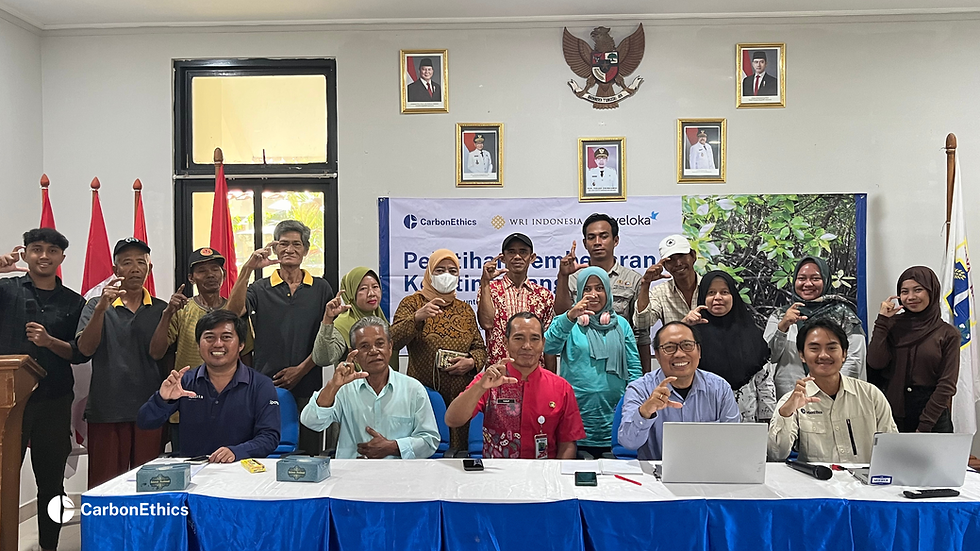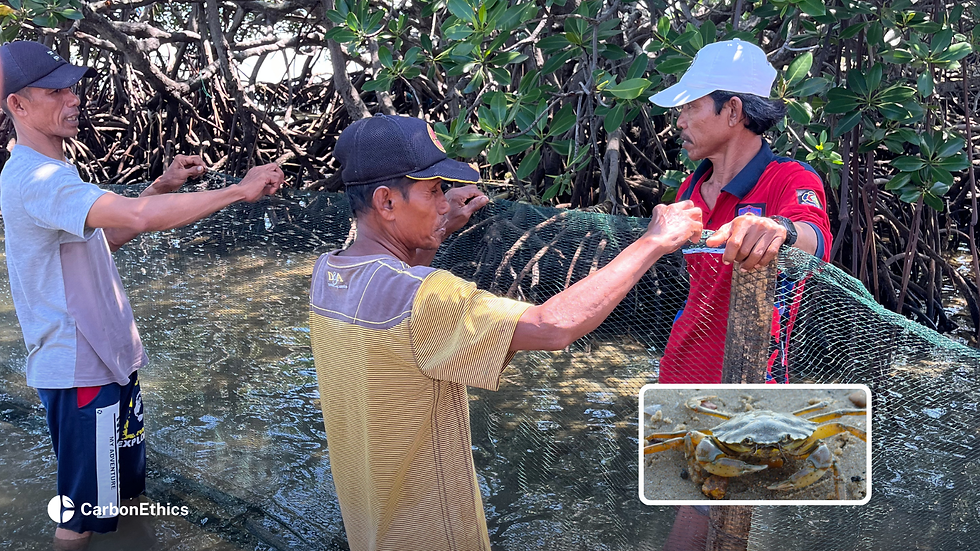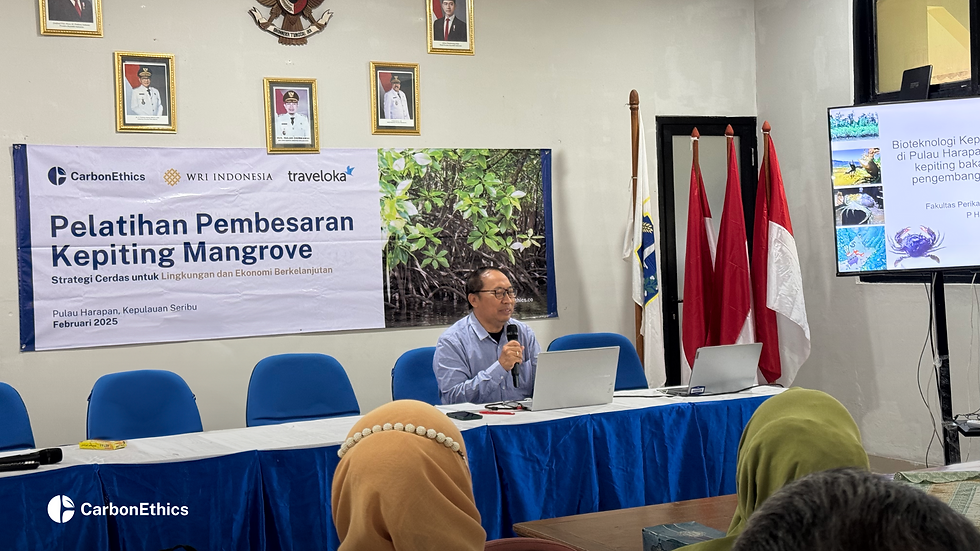Unlocking Mangrove Crab Cultivation's Potential to Support Local Livelihoods on Harapan Island
- Mutiara Kanza
- Mar 24, 2025
- 2 min read

At CarbonEthics, we believe in the potential to preserve mangrove forests while creating income opportunities, as long as we manage these efforts sustainably. We place local communities at the heart of our work, focusing on building partnerships and strengthening their capacity. Our approach centers on listening to their needs and supporting them in a way that allows them to thrive. In addition to empowering local communities, we also focus on supporting biodiversity, seeing it not only as a way to preserve marine ecosystems but also as an opportunity for local livelihoods to grow. In this effort, we combine local knowledge with the potential of biodiversity, such as the cultivation of mangrove crabs, to create new sources of income.
Advancing Local Knowledge on Mangrove Crab Cultivation Techniques

In collaboration with WRI and Traveloka, CarbonEthics organized mangrove crab cultivation training in Pulau Harapan, aimed at utilizing biodiversity to improve local livelihoods. Through our mangrove crab cultivation training, we’re helping communities unlock the potential of this resource, creating new income opportunities while also protecting essential ecosystems. The training consisted of an aquatic environment observation, a mangrove crab cultivation session, and a practical crab-rearing container workshop, concluded with a discussion and observation session with our mangrove farmers.
Previously, our local farmers attempted mangrove crab farming by sourcing seedlings from Lontar, Banten, and using a basket-based cultivation system. Unfortunately, only 7 out of 100 crabs survived, with most falling prey to octopus predation, highlighting the need for better farming techniques and predator management. Recognizing these challenges, we stepped in to support the farmers by introducing improved methods for crab cultivation, ensuring their knowledge and practices were enhanced for more sustainable livelihoods.

The training was led by Prof. Dr. Ir. Sulistiono, M.Sc., a professor at the Faculty of Fisheries and Marine Science, IPB University, and an expert in mangrove crab cultivation. The topics discussed focused on Mangrove Crab Biotechnology and Its Potential in Pulau Harapan, as well as Techniques for Site Selection and Monitoring of Silvofishery for Mangrove Crabs. The session was attended by our farmers' group, alongside representatives from the Seribu Islands National Park, fostering a collaborative exchange of knowledge and insights.
Promising Economic Opportunities through Mangrove Crab Cultivation
The training results show that Harapan Island offers great potential for sustainable mangrove crab farming, thanks to its dense mangroves, ideal tidal flow, and protection from human activities. Participants were highly satisfied with the training, with 80% stating that it provided valuable insights that will help grow their businesses, particularly in improving farming techniques and managing environmental challenges.
Join us to drive sustainable livelihoods through the blue economy! Visit carbonethics.co/partnership to learn more and get involved.




Experience the best Goa escort service with our 20+ high-profile and 100% genuine Goa escorts. Enjoy unforgettable moments designed just for you!
TSheets QuickBooks Online Integration
Connect TSheets with QuickBooks using QBIS. Auto-sync timesheets, hours & job costing — accurate payroll, zero manual work.
Unlocking the potential of mangrove crab cultivation on Harapan Island offers a sustainable path to uplifting local livelihoods. By integrating traditional knowledge with responsible aquaculture practices communities can benefit from both the environmental protection of mangrove ecosystems and a reliable income source. In a related note I found myself seeking Assignment help UK while working on a university assignment. They provided timely and structured support that allowed me to meet deadlines effectively leaving me more space to focus on core research and understanding.
Unlocking the potential of mangrove crab cultivation on Harapan Island offers a sustainable path to uplifting local livelihoods. By integrating traditional knowledge with responsible aquaculture practices communities can benefit from both the environmental protection of mangrove ecosystems and a reliable income source. In a related note I found myself seeking Assignment help UK while working on a university assignment. They provided timely and structured support that allowed me to meet deadlines effectively leaving me more space to focus on core research and understanding
Backlink
Get a strong backlink to your website through text advertising exchange
الحصول على باك لينك قوى لموقعك من خلال تبادل اعلانى نصى
WhatsApp
+4917637777797
شيخ روحاني
جلب الحبيب
BERLINintim
شيخ روحاني في برلين 00491634511222
شيخ روحاني
رقم شيخ روحاني
رقم شيخ روحاني
شيخ روحاني في برلين
رقم شيخ روحاني 00491634511222
الشيخ الروحاني
شيخ روحاني سعودي
شيخ روحاني في برلين 00491634511222
BERLINintim
bestbacklinks
backlinkservices
buybacklink
BERLINintim
HurenBerlin
شيخ روحاني رقم شيخ روحاني الشيخ الروحاني جلب الحبيب شيخ روحاني شيخ روحاني مضمون جلب الحبيب BERLINintim casinoberlin BERLINintim جلب الحبيب جلب الحبيب جلب الحبيب جلب الحبيب جلب الحبيب جلب الحبيب جلب الحبيب جلب الحبيب جلب الحبيب جلب الحبيب جلب الحبيب جلب الحبيب جلب الحبيب جلب الحبيب جلب الحبيب. ايات لجلب الحبيب العنيد . عظم الهدهد سريع الجلب للنساء . السحر…